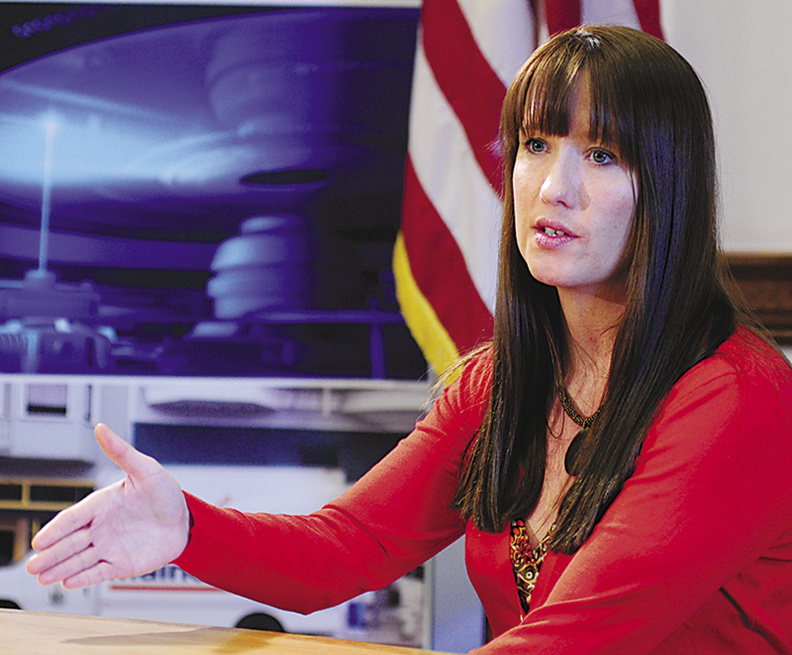PORTLAND — Maine’s blunt-spoken governor doesn’t mince words when opponents dare to cross him but he’s saved some of his harshest criticism for newspapers, once telling schoolchildren he isn’t a fan of papers and another time saying that reading one is “like paying somebody to tell you lies.”
Now it’s gone to an extreme, with Republican Gov. Paul LePage and his administration cutting off comments to three newspapers including one serving the state’s biggest city.
Adrienne Bennett, the governor’s press secretary, said Wednesday that it was her decision to give a blanket “no comment” to the Portland Press Herald, the Kennebec Journal in the state capital of Augusta and the Morning Sentinel in Waterville, where LePage once served as mayor. All three daily newspapers are part of MaineToday Media Inc.
“All we’re asking for is objectivity and a balanced approach to reporting. We’re not finding that MaineToday Media has done that with the LePage administration,” she said.
The announcement from the governor’s office was made after a Press Herald investigation of Department of Environmental Protection Commissioner Patricia Aho, a former lobbyist portrayed as working behind the scenes to roll back environmental laws and regulations opposed by her former clients in the chemical, drug, oil, and real estate industries.
The three-part series was titled “A lobbyist in the henhouse.”
Cliff Schechtman, executive editor of the Portland Press Herald, said the administration simply doesn’t like tough reporting and said the newspaper won’t be doing anything differently.
“This is about probing journalism that examines how powerful forces affect the lives of ordinary citizens. That makes the powerful uncomfortable. That’s what this is about,” he said.
Bennett said that the decision was not based on any single news report and that she didn’t think the new policy would prevent the newspaper’s reporters from doing their work or lead to people being uninformed.
People have other options including the AP, radio, television, weekly newspapers and bloggers, she said, and the MaineToday newspapers are welcome to use the state’s Freedom of Access Act for information.
“We’re fortunate enough to have a variety of media outlets and news sources to choose from. There’s certainly not going to be a lack of transparency from this administration,” she said.
The newspaper gag order wouldn’t apply during a natural disaster or other emergencies, she added.
LePage isn’t known for backing away from a confrontation, gaining attention in the past for telling the NAACP to “kiss my butt” and comparing the Internal Revenue Service to the Gestapo.
This legislative session began with a standoff in which the governor refused for weeks to meet fact-to-face with Democratic leaders. Last month, he even abandoned his State House office and decamped to work from the governor’s mansion after being told to remove at TV he’d installed outside his office.
The media hasn’t been immune from his ire, either. Even before he was elected, he used colorful language when he scolded the media after a newspaper report indicated his wife claimed residency in both Maine and Florida, allowing tax deductions in both states. He called it a clerical error.
The Portland Press Herald sometimes makes an easy target for conservatives because it’s based in a liberal city and is backed by a big political donor and philanthropist. Bennett reminded an Associated Press reporter that MaineToday’s majority owner is S. Donald Sussman, a wealthy financier who is the husband of U.S. Rep. Chellie Pingree, a Maine Democrat.
But while politicians spar with the media from time to time, it’s unusual for them to actually refuse to work with news organizations. For example, former Minnesota Gov. Jesse Ventura attacked what he viewed as irresponsible reporters, but he never made it a formal policy not to talk to entire news organizations.
Kelly McBride, a media ethics specialist from the Poynter Institute, a Florida-based journalism think tank, said such storms between politicians and the media tend to blow over. But in the meantime, she said, the governor’s posture will serve only to make him appear petty and to increase readership of the newspaper series.
“Publishers and editors face belligerent sources all the time. As long as they continue to be loyal to their audience, rather than their sources,” she said, “it usually works out for the journalist.”
Copy the Story Link
Send questions/comments to the editors.



Success. Please wait for the page to reload. If the page does not reload within 5 seconds, please refresh the page.
Enter your email and password to access comments.
Hi, to comment on stories you must . This profile is in addition to your subscription and website login.
Already have a commenting profile? .
Invalid username/password.
Please check your email to confirm and complete your registration.
Only subscribers are eligible to post comments. Please subscribe or login first for digital access. Here’s why.
Use the form below to reset your password. When you've submitted your account email, we will send an email with a reset code.